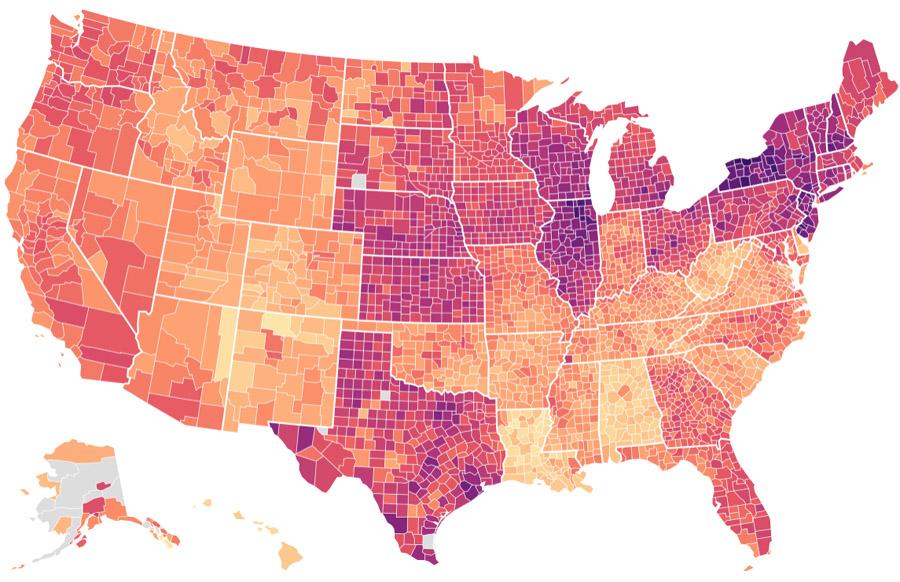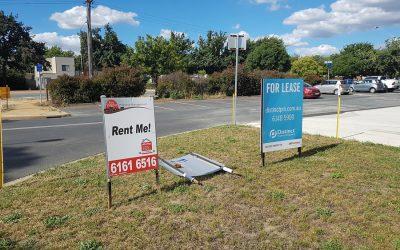
Average property taxes across states range from as little as a few hundred dollars a year to nearly $8,000 per year. Given the impact they have on real estate cash flow — or on your personal budget as a homeowner — we decided to break down property taxes by state and county.
Deni and Brian outline how property taxes impact you as an investor and landlord, how they fit into each state’s total tax burden, and how they’re impacting migration patterns across the US.
We published a detailed article on this topic with no fewer than five interactive maps, but here’s our favorite interactive map of property tax rates by county, for good measure:
Video Broadcast Version
Audio Podcast Version
Also available on iTunes, Stitcher, and wherever else you listen 🙂
Resources Mentioned in This Podcast & Video:

Deni Supplee: Hi everyone and welcome to our weekly podcast from Spark Rental. Last week we talked about the legal liability because of this pandemic, which is supposedly getting worse now, in the United States and the legal liability for landlords, and hopefully this would be helpful to those at this time. Seems to be rising again. This week Brian is gonna talk to us about what states charge and where are the lowest property taxes witch is kind of important when you are a real estate investor. So, with that I also ask you all to , please, share your comments and just participate so then we’re not just talking to air and each other, we talk to each other way too much and let us know where you’re checking in from. So, Brian…
Brian Davis: Yeah, and the property taxes, where you live and where you invest.
Deni Supplee: That would be awesome. I have to just interject here. Brian created these maps, and they are awesome, I was playing with them and we are gonna share the link, but you guys should play with them too, they are a lot of fun, they are very interesting, very eye opening. But, anyway, i shouldn’t have given that away. Brian, tell us about state versus counting levels as far as property taxes are concerned.
B: Sure, so I did shared that link in the comment here. We got a couple interactive maps that we created for property taxes both at state level and in accounting level. and by the way, we got a Mary Jane here who is tunning in from Sierra foothills, California.
Deni Supplee: Welcome.
Brian Davis: Glad to have you with us, Mary Jane.
Deni Supplee: How are your property taxes over there?
Brian Davis: Let us know what kind of property taxes you guys are paying we are out of the country here. So before we jump in here, it’s worth noting that property taxes are typically charged at the county level, so when we talk about state property taxes, we are talking about average across all of the different counties within that state, so average property taxes in that state. Because each county does set his own property tax rate. We created an interactive map for both property tax rates in the state level and property tax rates on the county level. And property taxes can vary widely within the same state. One quick example here: in Pima county, Arizona they charge 5 times more than the tax rate in Apache county, Arizona. So, Pima County charges a little under 1%, 0.96% of the property value each year. And then in Apache County, a couple counties over, they charge 0.18% of the property value, so really low rate.
Deni Supplee: Would you say that rural versus suburban versus city have a lot to do with that, cause I know where I’m, the further out in the country go, the taxes definitely decline and then we’re in like really Filly suburb where the taxes are like crazy.
Brian Davis: There is a trend. Is not a perfect 1 to 1 correlation but you can definitely see that as a pattern where urban areas tend to charge higher tax rates and then more rural counties do tend to charge lower tax rates, that’s true. And that actually, you got a double impact from that property tax level, because home value tend to be higher in major metropolitan areas. So, not only they tax to the higher rate, typically, but you also have higher home values, do you get hit twice as hard with your annual property tax bill.
Deni Supplee: It’s all a way out, because more people tend to flock to the suburbs, then the rural areas.
Brian Davis: Yeah. One other thing that’s kind of interesting to know here, while we’re talking about the state versus the county level. So you do see clear patterns across states with property taxes, because some states charge more in income taxes or more in sales taxes , and then they charge less in property taxes or vice versa. And of course some states charge less in taxes to begin with and keep a lower state budget. Sometimes states will collect money in the form of income taxes and then distribute that money through the counties, so counties charge less in property taxes. Some states just charge a much higher tax burden to cross the board, and we’ll talk more about total tax burden in a few minutes, so by total tax burden we’re talking about a combination of property taxes, income taxes and sales and excise taxes. By the way, if you’re not familiar with the term excise taxes, excise taxes are on specific good and service, example: gasoline taxes or tobacco (a lot of states charge extra taxes on tobacco or alcohol).
Deni Supplee: A place like Delaware, they have low property taxes and no income or low income taxes, right?
Brian Davis: In Delaware, actually, is famous for charging no sales tax. So, Delaware, has the second lowest total tax burden in the country. Witch is why a lot of companies but the head quarters there. Delaware are also protects business rights better than most states do. And it is working, they have attracted a lot of companies head quarters there. So when you’re comparing taxes, if your considering moving to another state and you are comparing taxes, you really have to include all of these different types of taxes to get that total tax burden picture. Because, I’ll use taxes as an example here. Taxes has relatively high property taxes, they charge no income tax. So, if you just look at prepérty taxes, and base your decision of where to live in just property tax alone, than you’ll miss out in the fact that Delaware, Taxes has a relatively low tax burden, but they are charging more property taxes because they’re not charging income taxes.
Deni Supplee: now, as an investor, should you be really concerned with the income tax?
Brian Davis: It depends. As an investor you should be more concerned about property taxes, cause than does impact your cash flow for rental property, at least. Now in some states will try to charge you incomes taxes if you sell and invest in property in their state. I know that Maryland does that. Now if you are an out of state investor, and you own a rental property in Maryland and try to sell that property, they will actually, the title company who does the settlement, they will set aside a certain amount of money in escrow to pay income taxes to the state of Maryland, even though you are not a resident of the state of Maryland. So, the People Republic of Maryland strikes again!
Deni Supplee: So, let’s get into some of the states. What are some of the lowest property taxes, in which states?
Brian Davis: So, the ten states with the lowest property taxes, we’ll just go through them real quick, so: Hawaii has the lowest property tax rate. So we’ll go though by tax rate and then we’ll also go through by tax actual dollar amount. because those are two different things. So, Hawaii, people would be surprise to know, has the lowest property tax rates in the country, in an average of 0.30%, the Alabama 0.42%, Louisiana 0.50%, West Virginia 0.53%, Delaware 0.55%, South Carolina 0.56%, Wyoming 0.57%, Colorado 0.63% and then Arkansas 0.64% and then rounding out the 10th state with the lowest property taxes is Mississippi with 0.65%
Deni Supplee: Now explain that a little bit, the percentage that you use?
Brian Davis: yeah, so that’s just the percentage of the property value, that the countie collects in property taxes each year. So just to use an easy example, if you have a property that is as an excess to value over $100.000,00 and the property tax rate is on 1%, then you would pay $1.000,00 a year in property taxes.
Deni Supplee: Hawaii, I didn’t expect that.
Brian Davis: Well, so that’s the thing. Hawaii has really expensive real estate. So, if you look at the average dollar amount collected each year in these states, Hawaii is not on the top 10 of dollar amount property tax rates. But the rate is lower and they can get away with that, largely because the property value are so high in Hawaii.
Deni Supplee: Wow, interesting. Makes you think twice like maybe we should invest in Mississippi.
Brian Davis: A lot of the southern and western states have seen some more inbound migration over the last few years. So, every year Deni and I run analysis of total tax burden among states versus migration patterns within the states. United Van Lines releases a report each year that’s great, super detailed about witch states Americans are moving out of and witch states they’re moving into. And its not a perfect correlation between tax rates and where people are moving, but there is a clear correlation. So, for example: 4 out of the top 5 outbound migration states, where people are leaving are all on the top 10 list for the higher tax states in the US. So, New York, New Jersey, Connecticut, Illinois, people are moving out of there in record numbers and they are all on that top 10 list for the highest tax states in the US, California and Iowa also both in that list, they are in the top 10 list for states that people are moving out of and also in the top 10 list for the highest tax states in the US. So that’s a lot of overlap there and if you break down to average total tax burden in the top outbound states in compare to the tax burden in the top inbound states. There is a different, a noticeable difference, in the average tax burden. So, for that top outbound state that people are leaving the total tax burden average is a little over 9,5%, is 9.51%. For the top inbound states it is under 8%, is 7.9%. And if that seems close, is actually not as close as it seems, is because the total range here for total tax burden is between 5% and 12% total, but almost all of these states actually fall into 7.5% o 10% range. So there a couple outliers that charge really low taxes or really high taxes, like Alaska and Delaware charge really lower taxes, down to 5% and 6% range. And then we got a couple really high rates, like New York that’s 12.5% or tax burden, but most of these states are falling in that 7.5% to 10% range. So for the top outbound states to be close to 105 and the top 10 inbound states of tax burden under 8%, it actually is a pretty big difference, given how narrow the range is for theses states.
Deni Supplee: Have you ever… Like, I know here, we have a ton of people who have left New Jersey, move to Pennsylvania but still work in New Jersey, because is so close. I just, recently sold a house to someone who work at New Jersey and they wanna live in Pennsylvania . Do you ever think that New Jersey ever lower property tax? Have you ever seen states or counties, I’ve seen counties do it. But have you ever seen statewide?
Brian Davis: So, property taxes are access to the county level, so if enough counties lower their tax rates, then you’ll seen that the state average drops down. But New Jersey has the highest property taxes in the country, and that’s rather you look at tax rate, new Jersey charges over 2% every year, 2.1% of the property value, they charge in taxes, which is a ton of money. And the average dollar amount, they are also the highest, the worst average of dollar amount too. I think that average dollar amount is $7.800,00 a year in property taxes alone. It’s crazy! So, 100% people are definitely leaving New Jersey. It is one of the top outbound migration states. And while I’m sure that taxe rates are not the only reason why people are moving out of New Jersey, is certainly not encouraging people to stay.
Deni Supplee: And it eventually it affects house prices, witch some areas there are already seeing.
Brian Davis: I’m from Baltimore, and Baltimore city is kind of unique, it has its own county jurisdiction, as opposed to the surrounding counties. But Baltimore city charges like 60% or 70% more in property taxes then the surrounding counties does. So, when you look at the property values on the line, on the border between the ity and the county. property values are something like $100,000 or $125,000 more across the street from each other, because of the line. And now that’s not only about property taxes some of that is schools as well. My mother, for example, she leaves within a thousand feet of the border between Baltimore city and county and her home value is 6 figures, say $100,000 or $115,000 less than the homes that are very equivalent homes, that are 1,000 feet north of her. I mean, it’s crazy how these do affect property values.
Deni Supplee: It is. And isn’t always true that the higher the taxes, the better the schools. That used to be something that we said in Pennsylvania, but it is definitely not.
B: Yes, Baltimore city is a perfect example of that. Baltimore city has some of the worst schools in the country, and actually pay among the highest per student budget in the country. So no, that’s not necessarily a correlation between school quality and performance versus property tax rates.
Deni Supplee: So, let’s talk about how these all affects cash flow, Brian.
Brian Davis: Well, property taxes, obviously does impact your cash flow. Is an expense that you have too include every month when you run the number on a perspective rental property. And, by the way, we’ll share a link here. If anyone is interested on looking at the data on migration patterns in the US we’ll include a link so you can look at that and compare to couple interactive maps there, as, well. By the way, Mary Jane said that property taxes are not as bad where she is as you might think, being in California.
Deni Supplee: I immediately thought California probably super high.
Brian Davis: There are high taxes in California, across the board. As a total tax burden they’re up there. Yes, property taxes do impact you as a real estate investor. like we talked about a few moments ago, income taxes can also impact you as a real estate investor even if you don’t live in that state. We used the example of Maryland, where they would withhold your proceeds from your sale of the property, if you live out of state, cause they wanna tax you. they wanna tax you on that income. And it’s not just property taxes either, as a real estate investor who is working at the country and trying to decide where to invest, you do wanna take total ax burden into account, along with these migration patterns. Because this is all about demand for real estate, right? So, in places that have high taxes and where people are migrating out of that state or country, that impacts the demand and the prospects for the properties to appreciate in value. So it’s not a one to one correlation between tax rates and where people are moving. Like Vermont, is good example of a state with very high taxes where people are moving are moving in. More people are moving into Vermont than moving out. But, as a general rule, there is a pattern that the states with a higher taxes tend to be the states with the highest outbound migration rates. So, just keep it in mind when investing.
Deni Supplee: We have a question from Michael ”Can property taxes be negotiated during ownership?”
Brian Davis: Well, so you can file a (not a complaint) to have you property reassessed if you disagree with how the county has assessed. Because, of course, the countie assessor is going to make it out like your living in a big mansion.
Deni Supplee: And if you improve a property? that’s what permits, to me, are for. They wanna make sure, and see what you’re doing so they can pop these taxes up.
Read about rental property calculator.
Read about lowest down payment for investment property.
Brian Davis: Yes, but you can file to have your property tax assessment reassessed, if you think they’ve over assessed. Which, of course, they always wanna do, because they wanna get the maximum dollar out of you. So, that’s actually worth doing across the board if you think that is even close to been higher that it should be. Go ahead and object to it, usually is just a form letter that you send in to the county and you send in comps and other documentation that reinforces your claim that the property taxes where less than what they say it.
Deni Supplee: And then Mary Jane says: ”I’ve notice a pre tax cap rates in Illinois investment properties are super high but of course you can consider tax rates the cap rate go down. have you notice property tax rates affecting property valuation?”
Brian Davis: Yeah, so that’s where we touched on a few minutes ago about Baltimore city versus Baltimore county for example. Where the more higher tax rates do have a heavy impact on property value. So it can impact that. when you calculate cap rates, you do need to include expenses like property taxes. Cap rate, that should include all of those expenses other than mortgage payment , it should include property taxes , landlord insurance, maintenance and repairs and property management fees, all those expenses. So, you definitely should include those when you run the numbers.
Deni Supplee: And just to touch on the affecting property valuation when i know we have an area in Montgomery county, and it’s a little town and they have ridiculous property taxes, and it’s pretty close to Philly to, but they have excellent school district, so people like to move there, and it s close to Philly. But their property prices have dropped, big time. And i even have buyers to this beautiful house, that’s really an expensive, but they look at the property taxes and they run immediately.
Brian Davis: Yeah, I mean you have to take a realistic view of your cost of ownership. Whether you are a landlord or a homeowner, whenever your looking at buying a property. So, definitely include all of these expenses when you run the numbers. And, by the way, I added a link in the comment here, these are a Free Cash Flow Calculator, that does include fields for expenses like property taxes.
Deni Supplee: So, is there anything else, Brian, that you can add to all of this? This is interesting.
Brian Davis: No, go check out the article with the interactive map, so you can check out how your county compare to other counties and how states compare. It’s fascinating stuff and don’t be afraid to invest out of state. You are not locked into your home market as a real estate investor. it’s easier than ever to invest long distance nowadays, so take advantage of tools like Roofstock and others. We have a whole bunch of articles, tools and resources on our site to help you invest out of state. Get out there and check out some new markets!
Deni Supplee: And don’t forget to check us out on the podcast, if you’ve missed any of these live broadcasts and fell free to rate and reviews us!
Brian Davis: Please do. That helps get the word out. So, we will see you guys next Tuesday on the Tuesday before Thanksgiving, have a great week! And let us know what topics you wanna hear about! This is all about you guys and what you wanna learn. So, we’ll see you next week. Have a great rest of this week!
Read llc mortgage loan requirements.
Read does california have rent control?























